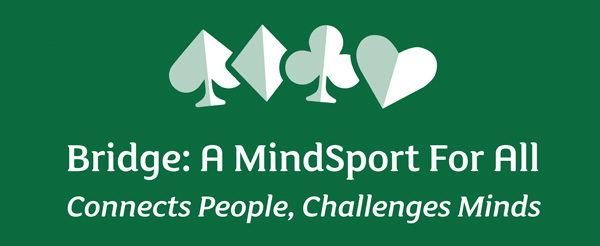Bridge: A MindSport for All (BAMSA) showcases how the card game bridge can enhance well-being, promote healthy ageing, foster inclusivity, and strengthen social connections
Based at the University of Stirling in Scotland, BAMSA’s research team carries out sociological studies on bridge, working collaboratively with bridge organisations to achieve three key goals:
- to transform the image of bridge and explore the social, emotional, and cognitive benefits of bridge;
- to enable more people of all ages and backgrounds to learn and play;
- to explore, with diverse stakeholders, the sustainability and scalability of bridge as a mindsport.
Bridge is a four-player card game played by opposing pairs (try the Tricky Bridge app to learn the basics). It is the only mindsport that is always played with a partner, and the partnership works together to solve problems which arise at the bridge table. Given the social and emotional interactions between each player and their partner, and between players and their opponents, bridge offers the opportunity to develop life skills, such as resilience and mental toughness.
Bridge Research
Since 2016, Bridge: A MindSport for All has been establishing a new academic discipline, Mindsport Studies. The BAMSA website provides detailed information on eight research projects, some completed and others ongoing, along with a wide range of associated publications and accessible audio-visual outputs. Led by Samantha Punch, Professor of Sociology in the Faculty of Social Sciences at the University of Stirling, the sociological study of bridge is rapidly expanding.
Recent studies include the strategic interactions of elite players, community and identities, motivations and participation, emotional management, digital bridge and gender. These studies explore the lived experiences and interactions of bridge players of different backgrounds who play across different settings and skill levels.
This research has significantly enhanced our comprehension of mindsports, providing valuable insights into their complexities and applications. For example, BAMSA’s most recent publication examines the lived experiences of bridge playing-sponsors who play with professional players. It builds on a previous paper which looked at the livelihoods of professional players.
A related strand of work led to the publication of an article in The Conversation which critically analysed the current state of gender equality within top-level bridge, and considered the merits of women-only tournaments. BAMSA’s diverse portfolio of research projects even uncovered the dynamics shared by bridge-playing couples who move between fun, fights and failures when playing bridge together.
These findings have important implications for skill development, professionalisation, and participation of bridge and mindsport players. They also help define mindsports relative to traditional sports, illustrating the similarities and differences between them.
In a key recent paper, Scott and Punch showed that the mind and body are interconnected during the physical performance of high-level competitive bridge. These newfound notions of endurance, stamina, and physicality – as detailed in the associated Research Outreach article – pose fundamental questions about the understandings and framings of traditional sports, esports, and mindsports.
Books on Elite-level Bridge
An edited collection of in-depth interviews with top players from the USA and Europe appear in BAMSA’s first book, Bridge at the Top: Behind the Screens. The more recent book: The Art of Becoming a Top Bridge Player explores the sociology of bridge in an accessible manner for bridge players. Based on 60 interviews with top players, the book covers various human aspects of the game: coping with mistakes, emotions, partnership dynamics, winning and losing, and how to improve.
Mindsport Education
Until recently, BAMSA research has focused on adults rather than young people. The team’s latest four-year study explores how bridge can be used as an educational tool in primary and secondary schools and as an extra-curricular activity. Dr Marina Milosheva, leading the project, is conducting research on youth, schools and mindsport education in Scotland, England, Norway and the USA.
The project is investigating the ways that bridge builds on the Curriculum for Excellence (CfE), Getting it Right for Every Child (GIRFEC), and the key pillars of the curriculum: Health and Wellbeing, Numeracy, Literacy and Collaborative Learning. As an inclusive game, the project researches the cognitive, emotional and social benefits for all pupils. In particular, it considers how bridge offers opportunities for children to develop life skills including cooperation, communication, problem-solving and fair play. Core themes of the project are teacher training, community-building, and inclusivity.
BAMSA’s International Network
BAMSA’s remit extends beyond the world of academia. The BAMSA network is an inclusive forum of research associates, practitioners (players, teachers, organisers) and policymakers from all over the world. Many of those involved are specialists in their own fields who contribute to the network their insights, experience and expertise. The BAMSA team have hosted two international online conferences. The first, Bridging Academia, Policy and Practice, was attended by over 500 delegates from 62 countries. The second was co-organised with RealBridge: Teacher and Coach Conference. BAMSA is an outward-looking project that values collaboration, communication and impact.
BAMSA has collaborated with bridge organisations for various studies: Bridging Minds (with the World Bridge Federation and the European Bridge League), Bridging Covid (with the Scottish Bridge Union), Bridging Wellbeing (with English Bridge Education and Development), and Bridging Schools (with the American Contract Bridge League Educational Foundation and the Norwegian Bridge Federation).
Thanks to BAMSA Funders
The Davenport Fund, the Levine Family Foundation, the World Bridge Federation, the European Bridge League, the American Contract Bridge League Educational Foundation, the Scottish Bridge Union, English Bridge Education and Development, the Norwegian Bridge Federation, and other BAMSA donors via Crowdfunding.



